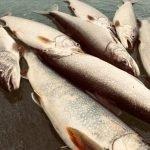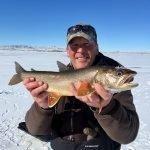Utah Wildlife News Release
Lake trout limit increases starting Jan. 1
Manila — Plenty of waters close to your home will provide great ice fishing this winter. Those waters might draw lots of anglers, though.
If you’re looking for some space, consider a trip to Flaming Gorge Reservoir. In addition to great fishing and room to stretch, the reservoir is surrounded by spectacular scenery. And starting Jan. 1, the lake trout limit at the reservoir will increase to 12 lake trout a day. Only one the lake trout can be over 28 inches, though.
(The current lake trout limit is eight fish, with only one over 28 inches long.)
Randy Oplinger, sport fisheries coordinator for the Utah Division of Wildlife Resources, encourages you to take advantage of the opportunity and keep your limit of smaller lake trout. He says a growing population of smaller lake trout is causing problems for anglers. “The smaller lake trout are competing with kokanee salmon and rainbow trout for food,” he says.
Oplinger says the competition is affecting both the number and size of kokanee and rainbows in the reservoir. “Kokanee and rainbows are the two fish lake trout prey on,” he says. “If we can reduce the number of smaller lake trout, they’ll be more kokanee and rainbows for anglers to catch and for the remaining lake trout to eat. Keeping your limit of smaller lake trout should produce bigger lake trout to catch in the future.”
Oplinger also reminds you that you must keep any burbot you catch.
Fishing tips
Plenty of lake trout up to 25 inches long are waiting for you at this scenic reservoir on the Utah, Wyoming border. Ryan Mosley, the Utah Division of Wildlife Resources’ lead aquatic biologist at Flaming Gorge, says getting a lake map and studying it thoroughly is the first step to catching them.
The area you’ll want to study first is the north end of the reservoir, between the confluence (where the Black’s Fork and Green river arms meet in the reservoir) south to the area called Buckboard. “The best lake trout fishing usually happens at the start of the ice fishing season,” Mosley says, “and that’s the area that freezes first.”
As you study the map, look for contours, main channel points and flats that are adjacent to the main river channel and in water that’s 50 to 80 feet deep. “Those are the areas you’ll want to fish,” Mosley says.
Before you head to the reservoir, make sure you have an electronic fish finder that will help you spot lake trout under the ice. You’ll also want a medium action fishing rod with a reel spooled with fishing line that’s 8-pound test or stronger.
To get your offering down fast, use ¼- to ½-ounce lures. Various jigging spoons, swim baits and jigs work, but the traditional go-to lure is a white tube jig that’s 2½ to 3 inches long. “Always place a small piece of sucker or chub meat on the lure’s hook,” he says. “The meat will entice fish to bite your lure.”
Mosley says lake trout are usually found close to the bottom. “That’s not always the case, though,” he says. “Sometimes, they’ll suspend just 15 to 20 feet under the ice. When you see fish on your fish finder, don’t be afraid to reel your lure up to the fish.”
When fishing through the ice at Flaming Gorge, you can use up to six fishing poles or tip-ups. Mosley uses a variety of techniques, from aggressive jigging to subtle jigging with lots of pauses. Another tactic he often uses involves at least two poles. After placing a small piece of sucker or chub meat on the hook of a lure, he lowers the lure close to the bottom and then lets the pole sit still. In a second hole drilled close to the first hole, he lowers a jig to the bottom and starts jigging it.
“This technique draws fish in and gives them a couple of options: they can take the lure I’m jigging or, if they’re not in an active feeding mood, they can easily take the lure that’s sitting nearby and isn’t moving,” he says.
Mosley says lake trout can be finicky. “But once you find them,” he says, “you can do really well. Let the fish ‘tell’ you what they want by trying different techniques.”
If you’re fishing with more than one line at Flaming Gorge, please remember that your name must be attached to each line. Also, if you’re from Utah, but you want fish on the Wyoming side of the reservoir, make sure you have either a Wyoming reciprocal fishing stamp or a Wyoming fishing license.



